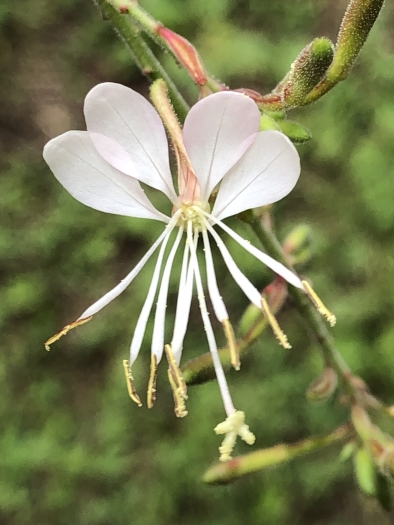Common Evening-Primrose
(Oenothera gaura)
Common Evening-Primrose (Oenothera gaura)
/
/

Bob
CC BY 4.0
Image By:
Bob
Recorded By:
Copyright:
CC BY 4.0
Copyright Notice:
Photo by: Bob | License Type: CC BY 4.0 | License URL: http://creativecommons.org/licenses/by/4.0/ | Rights Holder: Bob | Publisher: iNaturalist | Date Created: 2021-09-02T16:47:07Z |


















































Estimated Native Range
Summary
Oenothera gaura, commonly known as Common Evening-primrose, is a biennial herb that is native to open woodlands, grasslands, and prairies across Central and Eastern North America. It can grow up to 6 ft (1.8 m) in height and is characterized by its tall, erect form with a rosette of leaves at the base and a spike of flowers on the upper half of the plant. The lance-shaped leaves can turn red as they mature. The plant is covered with soft, white hairs, giving it a slightly fuzzy appearance. Its flowers are initially light pink and transition to a more vibrant red/pink hue in late summer to early fall, typically blooming from July to September. The flowers open in the evening and close by the next noon, hence the name "evening-primrose." This timing makes the plant particularly attractive to nocturnal pollinators such as moths.
The Common Evening-primrose is valued for its ornamental flowers and its ability to attract pollinators like butterflies and bees. It is often used in wildflower gardens, naturalized areas, and as a border plant. The plant is drought-tolerant and requires minimal maintenance, making it suitable for xeriscaping. It thrives in full sun and well-drained soils but can tolerate a range of soil conditions. While it is not typically prone to serious diseases or pests, it can become weedy and may self-seed aggressively if not managed. Evening-primrose oil, extracted from the seeds, is used for its potential medicinal properties, including anti-inflammatory and skin-healing effects.CC BY-SA 4.0
The Common Evening-primrose is valued for its ornamental flowers and its ability to attract pollinators like butterflies and bees. It is often used in wildflower gardens, naturalized areas, and as a border plant. The plant is drought-tolerant and requires minimal maintenance, making it suitable for xeriscaping. It thrives in full sun and well-drained soils but can tolerate a range of soil conditions. While it is not typically prone to serious diseases or pests, it can become weedy and may self-seed aggressively if not managed. Evening-primrose oil, extracted from the seeds, is used for its potential medicinal properties, including anti-inflammatory and skin-healing effects.CC BY-SA 4.0
Plant Description
- Plant Type: Herb
- Height: 2-4 feet
- Width: 2-3 feet
- Growth Rate: Moderate
- Flower Color: Pink, White
- Flowering Season: Summer, Fall
- Leaf Retention: Deciduous
Growth Requirements
- Sun: Full Sun
- Water: Low
- Drainage: Medium
Common Uses
Bee Garden, Bird Garden, Butterfly Garden, Drought Tolerant, Hummingbird Garden, Rabbit Resistant, Street Planting
Natural Habitat
Native to open woodlands, grasslands, and prairies
Other Names
Common Names: Biennial Bee-Blossom , Biennial Gaura , Gaura Bisannuel , Gaura Bisannuelle , Småblommigt Sommarljus
Scientific Names: Gaura biennis , Oenothera gaura , Gaura biennis var. biennis , Gaura biennis var. typica , Gaura pitcheri
GBIF Accepted Name: Oenothera gaura W.L.Wagner & Hoch